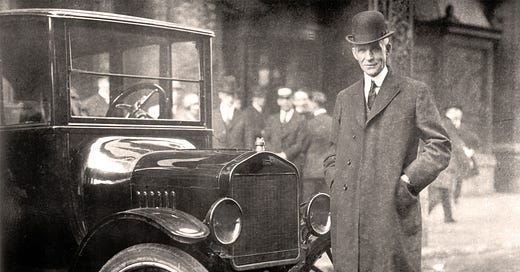I was bantering online with an old friend and fellow historian and I hit him with my best shot: history is un-American. If you think like an historian, and especially if you think America and its future actions should be informed, or possibly even constrained, by history, you are clearly un-American. History is more or less bunk, Henry Ford famously said, and Americans can safely ignore it. We are like gods, creating our own futures out of nothing, imposing our will on everything around us.
This attitude, this hubris, explains much about the U.S. military’s woeful record since 1945. The French lost in Indochina? No matter. Americans will prevail in Vietnam, Laos, and Cambodia because we’re not the French. The Soviet Union lost in Afghanistan? No matter. Americans will prevail there because we’re not the Russians. Overthrowing Saddam Hussein and his minority Sunni government will unleash chaos that strengthens Shia forces in Iraq, aligning that country more closely with Iran? No matter. America will bring order and the blessings of democracy to Iraq at the point of gun or a Hellfire missile.
Karl Rove, a major player in the Bush/Cheney administration, summed up this hubris in this now-infamous passage:
“We’re an empire now, and when we act, we create our own reality. And while you’re studying that reality — judiciously, as you will — we’ll act again, creating other new realities, which you can study too, and that’s how things will sort out. We’re history’s actors . . . and you, all of you, will be left to just study what we do.”
That man did not want for confidence.
Related to the idea of history being un-American is the business- and management-oriented nature of the officer corps in the U.S. military. To be promoted to field-grade (major or lieutenant commander), you almost have to have a master’s degree or be close to finishing one. But rarely do officers choose to pursue a master’s in history or any other subject related to the humanities. The master’s of choice is in business administration or some type of management.
By pursuing MBAs and management degrees, officers show their practical nature. They also set themselves up well for future careers once they retire or separate from the military. After all, who needs to know history, even military history? The U.S. military will simply act, creating its own realities, which feckless historians will then passively study as America’s real actors get on with the job of remaking the world in America’s image.
We live in the United States of Amnesia, Gore Vidal quipped, and history is part of that amnesia. Who remembers that America was at war in Afghanistan as late as 2021? It’s on to new “great power” struggles with China and Russia. Look forward, not backward, Barack Obama said when he became president, meaning there was no need to hold the Bush/Cheney administration responsible for anything, including torture and other war crimes. “We tortured some folks” — time to move on!
An expression I learned in the U.S. military is “analysis paralysis,” as in don’t overthink the problem. Act! But if America’s military record since World War II proves one thing, it’s that ignoring history because it’s “bunk” or less practical than another business or management course is a very unwise idea.
Acting should be informed by thinking. Dare I say, historically-informed thinking. Even for America’s wannabe gods.






Good observation.
History, not the factual kind but that filtered through emotion provides us with "we won the West", "we won WW2", "we built the Panama Canal after the French failed" and my favorite from my childhood when last it could be said with a straight face: "We never lost a war" and don't forget "tell it to the Marines." Old Glory releases this kind of thinking in a flood.
Pragmatism - we make up our minds and do it where others have floundered. No pussyfooting for America, we get the job done, just as we put a man on the moon and had the Manhattan Project. This is in contrast to the usual turmoil of a democracy, well known in Europe, but only in recent decades coming to be the case here with the breakup of the white Anglo-Saxon male consensus.
In fact, Hitler, who openly despised democracy as a group of people leading who had no idea what they were doing, the ignorant and the incompetent, was admired at first for his can-do, ignore the opposition successes in Germany.
January 6th was a statement: let's stop screwing around and do things right (literally). No less a humanitarian than John Dewey was very impressed by the command economy of WW1 America, though he came to realize his error in believing that wartime efficiency could produce peacetime results.
All this reflects an underlying pride that is very resistant to reality and tends to keep coming back even after a disaster like Vietnam or Iraq. Recall how the 1991 slaughter of the Iraq army brought back an American military standing tall and Reagan's "morning in America" as the shift of wealth to the top got underway.
Far from the pragmatism the country once exemplified, dreamland has taken over. Pragmatists would be on the case of global warming, but we continue to shop til we drop. It's hard to take America seriously but one must with all the lethality we so readily use.
Never come between a man and his paycheck. And we have a lot of powerful people in government whose paychecks depend on us making war on our enemies, real or not.